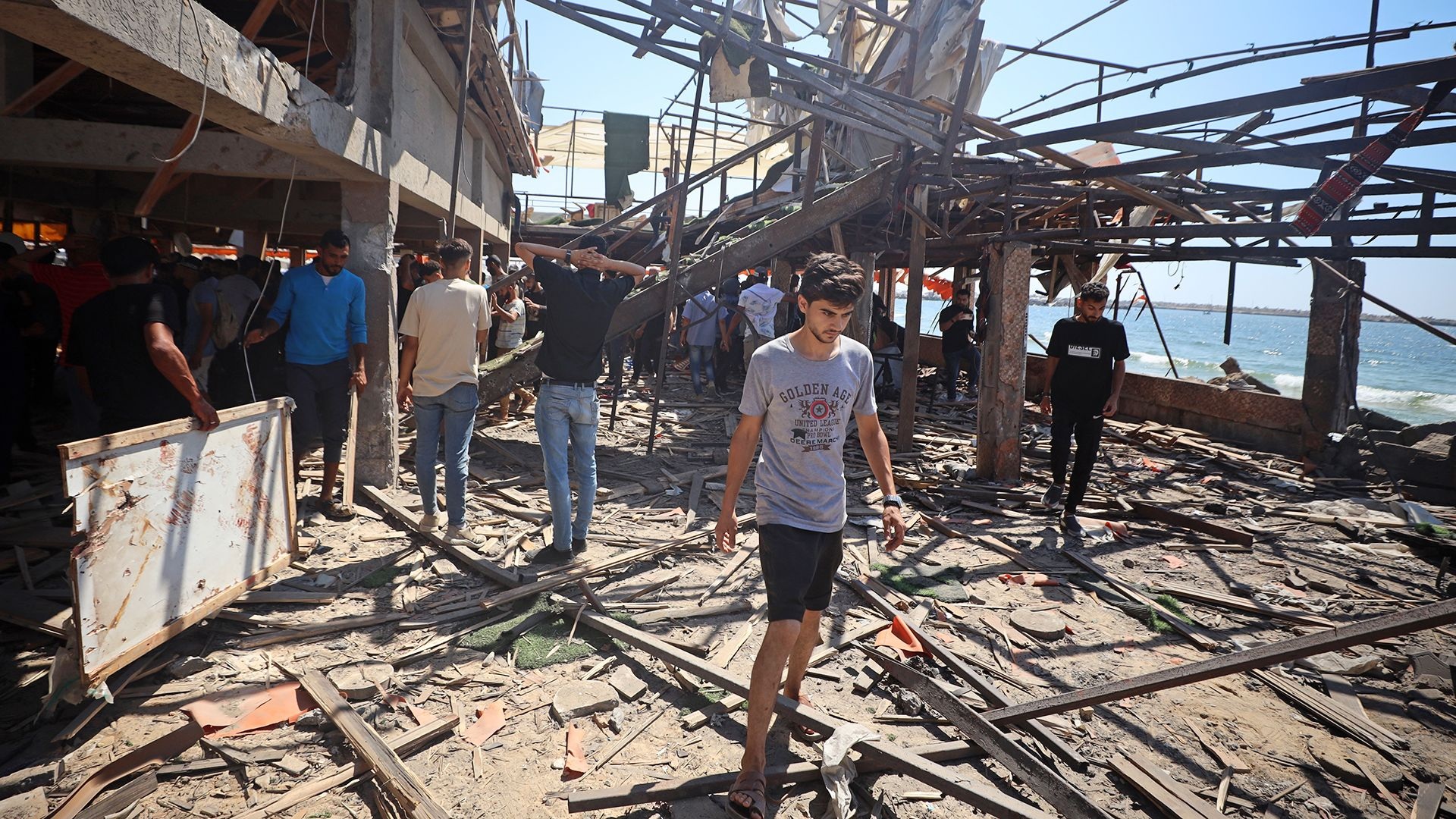At least 20 people lost their lives on Monday, June 30, 2025, when an Israeli air strike targeted a beachfront café in western Gaza, a space frequently visited by journalists, activists, and residents.
The strike devastated the Al-Baqa Cafeteria, a popular outdoor gathering spot made of tents along the Mediterranean coast.
According to Gaza’s Civil Defense, run by Hamas, emergency crews recovered 20 bodies and treated dozens of injured individuals.
Rescue workers are still searching through the crater left behind by the powerful explosion.
“I was just steps away on my way to use the café’s internet when the explosion happened,” said Aziz Al-Afifi, a local cameraman.
“I rushed to the scene.
“My colleagues, people I see every day, were lying there.
“It was horrific, bodies everywhere, people screaming, blood on the sand.”
Footage shared online by activists shows the moment a missile, reportedly fired by an Israeli warplane, struck the location.
The videos also capture the grim aftermath, with bodies strewn across the area.
Al-Baqa had become a vital space in war-torn Gaza, offering not just coffee and internet but also a rare sense of community and normalcy for professionals and locals trying to maintain their daily lives.
As of now, the Israeli military has not issued a statement on the strike.
The attack comes amid a surge in Israeli airstrikes across Gaza overnight.
Witnesses report that the bombardment forced hundreds of families to flee their homes.
Five bodies were also recovered in separate strikes, while numerous injured civilians were rushed to Al-Ahli Hospital in Gaza City.
This escalation follows one of the largest evacuation orders since hostilities resumed in March.
The current military campaign has prompted both internal and international calls for a renewed ceasefire.
Over the weekend, U.S. President Donald Trump stated online that Israeli Prime Minister Benjamin Netanyahu was working toward a deal with Hamas.
However, Hamas officials say negotiations remain stalled despite intensified mediation efforts.
The most recent ceasefire, which began in January and was structured in three phases, collapsed by March before fully materializing.
Israel resumed strikes shortly after, and imposed a near-total blockade on humanitarian aid.
Under pressure from allies and global institutions warning of mass starvation, Israel partially eased the blockade after 11 weeks.
Since then, aid efforts have been channeled through a controversial initiative known as the Gaza Humanitarian Foundation (GHF), jointly backed by the U.S. and Israel.
However, the delivery of aid has frequently been marred by violence. Reports of Palestinian casualties during aid distribution have become almost daily occurrences.
While Israel claims to use warning shots to deter perceived threats, eyewitnesses accuse its forces of lethal targeting.
Monday’s wave of strikes struck densely populated neighborhoods in Gaza City, including Shujaiya, Tuffah, and Zeitoun.
Social media videos showed night skies flashing with explosions, followed by rising plumes of smoke and flames.
One airstrike reportedly hit a school in Zeitoun, where displaced families had taken refuge.
“The explosions didn’t stop—it felt like an earthquake,” said Salah, a 60-year-old father of five.
“We keep hearing talk of a ceasefire, but here on the ground, it’s just death.”
The five deaths confirmed from Al Shati camp in western Gaza City add to a mounting toll.
Earlier, the Israeli military had ordered civilians to evacuate large areas of northern Gaza.
Most, however, relocated only a short distance within Gaza City, unable or unwilling to move farther south.
“We had no choice,” said Abeer Talba, a mother of seven from Zeitoun.
“We were warned to leave immediately, we’ve now fled seven times.
“We’re in the streets again, no food, no water.
“My children are starving.
“Sometimes I think death would be more merciful.”
Amid the mounting humanitarian crisis, there are growing fears that these evacuation orders and bombardments are part of a larger strategy to deepen Israel’s ground campaign into Gaza.
Yet some Israeli media speculate that military leaders may soon declare their operations close to completion.
Several former generals have warned that prolonging the conflict may escalate it into an unwinnable, guerrilla-style war with mounting casualties on all sides.
For now, the world watches as the Israeli leadership, led by Netanyahu, faces increasing pressure to shift gears, from warfare to diplomacy.
This comes amid a conflict that has already claimed over 56,000 lives in Gaza alone, according to local health authorities.







